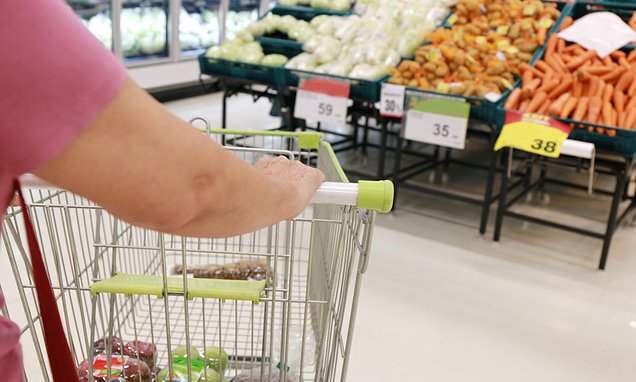Supermarket trolleys to spot people most at risk of a STROKE
Supermarket trolleys may be able to spot people most at risk of a STROKE by detecting a faulty heartbeat
- Trolleys fitted with electrocardiogram tech to detect hidden atrial fibrillation
Customised supermarket trolleys with sensors in the handles have been successfully tested as a way to identify people at risk of stroke.
The trolleys are fitted with electrocardiogram (ECG) technology to detect hidden atrial fibrillation (AF), an irregular heartbeat that is a leading cause of stroke.
The sensors pick up faulty heartbeats by tracking electrical signals from the heart as they pass through the hands.
If the sensors pick up potential signs of AF, a red cross flashes up on the trolley’s handle, while a green tick shows no abnormal signs were detected.
In a trial by Liverpool John Moores University, 2,155 adults used ten customised trolleys at four supermarkets. Participants were instructed to hold the trolley handle for at least 60 seconds continuously while they shopped.

Customised supermarket trolleys with sensors in the handles have been successfully tested as a way to identify people at risk of stroke (File image)
Cognitive behavioural therapy
Cognitive behavioural therapy (CBT) can improve the quality of life of people with atrial fibrillation (AF). A study by the Karolinska Institute in Sweden gave 127 patients with AF either ten weeks of online CBT, a talking therapy to help you change the way you think, or education about the condition.
Results showed CBT reduced patient anxiety about their health, the amount of care they needed, and led to increased physical and social activities compared with those not having CBT, reported the Journal of the American College of Cardiology.
The results, presented at the recent European Society of Cardiology conference in Edinburgh, revealed 220 shoppers were flagged as potentially having the condition.
When shoppers’ read-outs were later examined by a cardiologist, 59 of the 220 who got a red cross result were diagnosed as having the condition. The majority were unaware they were at risk.
They were all then given an appointment to have their heart checked with an NHS specialist.
One in 45 people in the UK has atrial fibrillation — up 50 per cent on a decade ago, due largely to an ageing population and poor lifestyle, according to the British Heart Foundation.
The condition increases the risk of stroke five-fold because blood pools inside the heart, and this can lead to a clot forming, which then travels to the brain. One in five strokes is linked to AF.
Yet many people don’t know they have the condition because the potential symptoms — palpitations, chest pain, tiredness, shortness of breath and dizziness — can be intermittent or non-existent.
But, if diagnosed in time, a stroke can be prevented with blood-thinning medication.
Researchers hope that customised supermarket trolleys could improve detection if used more widely. Professor Ian Jones, a senior cardiac nurse and study leader, said: ‘This shows the potential of taking health checks to the masses without disrupting daily routines.

The trolleys are fitted with electrocardiogram (ECG) technology to detect hidden atrial fibrillation (AF), an irregular heartbeat that is a leading cause of stroke (File image)
‘Over the course of two months, we identified 39 patients who were unaware that they had atrial fibrillation. That’s 39 people at greater risk of stroke who received a cardiologist appointment.
Eat more…
ALMONDS: They are good for your gut, according to King’s College London research, which found that people who snacked on a handful (56g) had higher levels of butyrate. This fatty acid provides fuel for the cells lining the gut, which allows ‘good’ gut microbes to flourish and the absorption of nutrients.
‘Checking for atrial fibrillation while people do their regular shopping holds promise for preventing strokes and saving lives.’
The researchers admit more work is needed to improve the accuracy of the ECG sensors, as only a quarter to a half of those who got a red light actually had the condition.
It’s also likely the trolley test will miss some AF cases, they said, as the symptoms can be intermittent. The study adds to the debate about whether a national AF screening programme should be introduced.
The National Screening Committee is looking into the idea, but is awaiting scientific studies on the cost effectiveness of such a scheme.
Commenting on the research, Chris Gale, a consultant cardiologist and a professor of cardiovascular medicine at the University of Leeds, said: ‘This study reaches out to the public to see if AF may be detected using a simple hand-grip tool while they are shopping.
‘The results are promising. However, a refinement in the technology may be needed to reduce the number of people inaccurately diagnosed, and tested in a larger study.’
Source: Read Full Article
